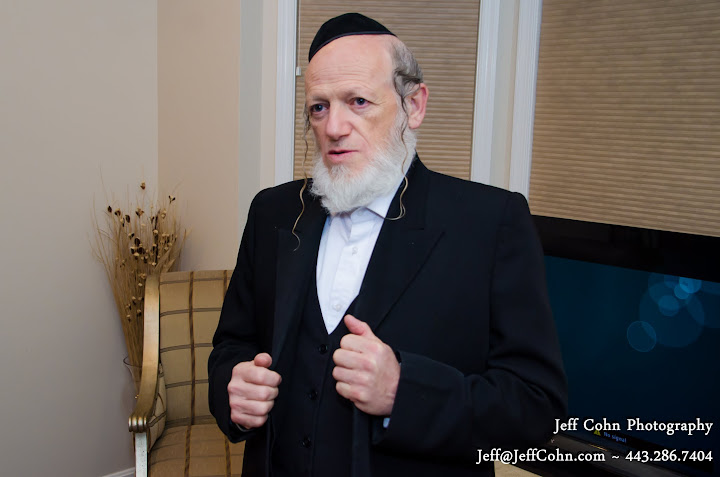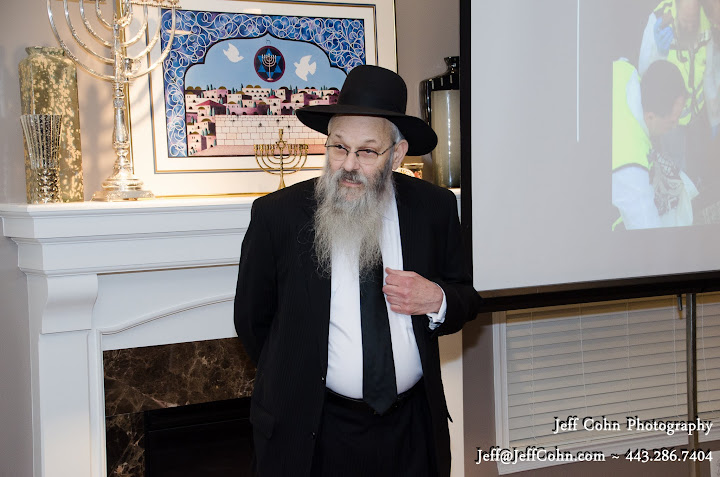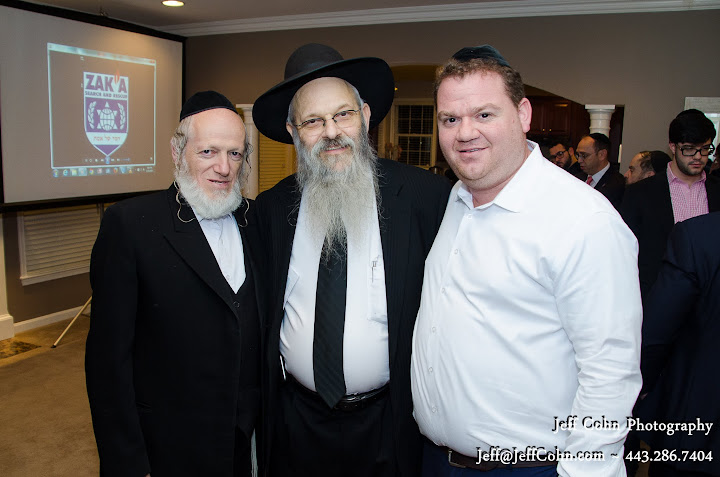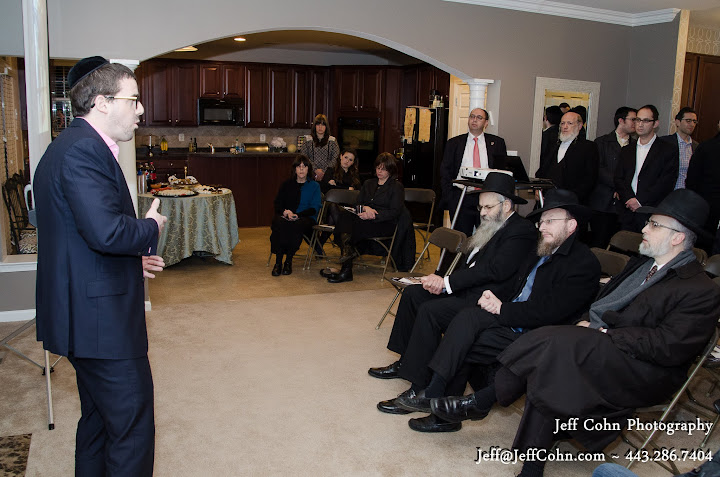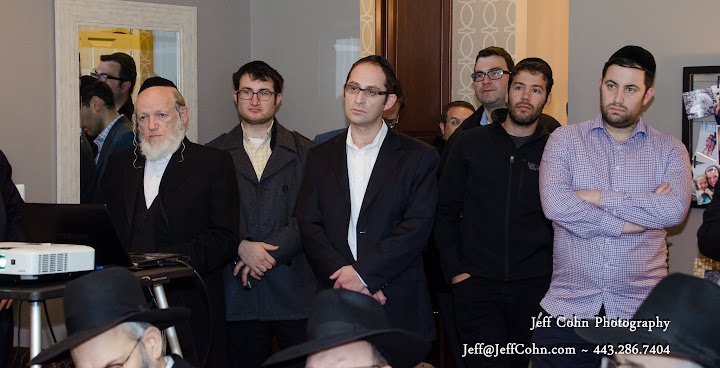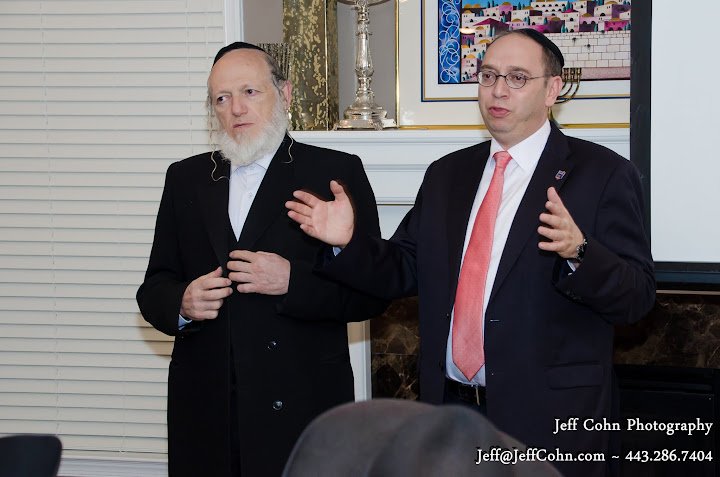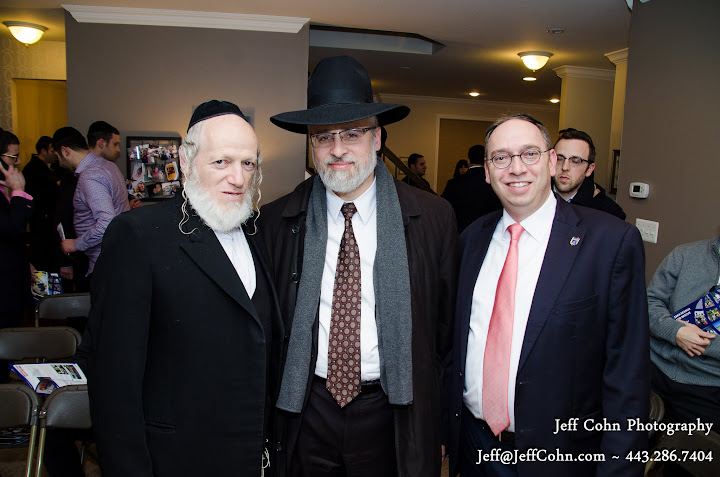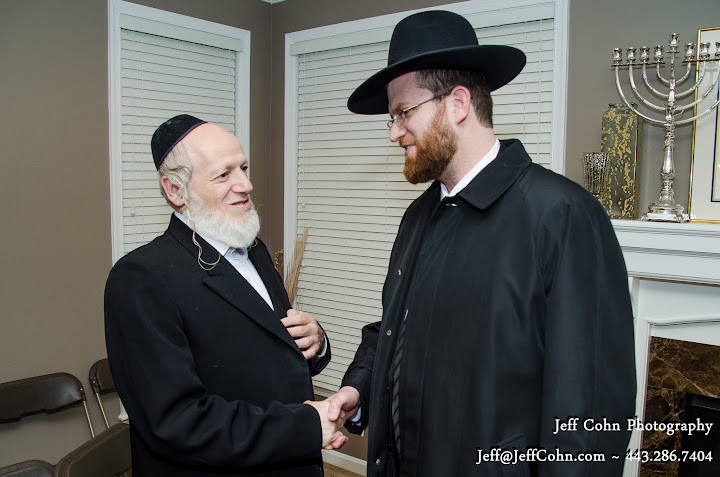

Posted on 01/04/16
Baltimore, MD – Jan. 4, 2106 - Although I had heard about the important work that ZAKA (an acronym that stands for Zihuy Korbanot Ason--Identification of Disaster Victims) does, meeting ZAKA chairman and co-founder, R’Yehuda Meshi-Zahav, and viewing the gruesome videos of his life mission at the parlor meeting held in the home of Dovid Meir and Faigy Loeb, last Wednesday evening, was eye-opening.
“What they do is unfathomable,” said Baltimore askan Yakov Katz, when he introduced R’ Yehuda. “Imagine when we see a disgusting thing; we turn the kids away. These people are 24/7 turning their face into that disgusting part of life--that part that we never want our children --and we never want to see; that we can’t handle. They are doing this on a daily basis. ZAKA is in a terrible matzav now…The government gives them 2 million shekels a year. Their budget is 3.2 million shekels a year and climbing every single day. They have 3,100 volunteers--all volunteers, no pay--and the government is late on their payment…They have a tremendous deficit now.”
What exactly do those 3,100 volunteers--most of whom are paramedics--do? They leave their families on the spur of the moment to respond to emergency searches and rescues, and they don’t get home before the mission is completed--even if it means going without sleep. Although ZAKA started out, in 1989, responding to catastrophes that occur in Israel, it has expanded worldwide and now has the status of an international rescue organization. Volunteers travel the globe to wherever their services are required. The ZAKA organization has been recognized by the United Nations and the U.S. Congress, as an international, humanitarian, voluntary organization. The natural disasters in Nepal, Thailand, Haiti and Japan, as well as terrorist attacks in France, Denmark and India and other places, are just some of the many disasters for which ZAKA has come to the rescue in recent years.
ZAKA’s main fields of activities are chesed shel emes (including gathering human remains for an honorable burial); emergency response; search and rescue; international activities; and information. Regional units deal with catastrophe victims, identification, terrorist attacks, accidents, and other unnatural death events. Volunteers are trained in victim identification and first aid.
The emergency response unit is composed of a fast medical intervention motorized unit spread out all over Israel--a unit of paramedics on call and first aid boxes located in diverse institutions and public places. The search and rescue unit is composed of the missing persons unit, the rescue unit, the motorized firefighting unit, the diving unit, and the canine unit. The information network is composed of a road safety educators team and an international information team.
ZAKA’s daily maintenance costs include: infrastructure, beepers, walkie-talkies, insurance, gasoline and perishable equipment. During the last 20 years, ZAKA needed an 8 million dollar budget. ZAKA’s most immediate need is purchasing ambulances and the vehicles needed to drive to those ambulances.
As Rabbi Beryl Weisbord, Mashgiach of Yeshivas Ner Yisroel, told those in attendance, “They are doing what we would have to do. If we’re not doing it, at least we have to support them to some extent, to see to it that they should be able to go on doing it. We are all maskim that this work has to happen. We are all maskim that this work is the most important work that exists in klal Yisroel. So, at least if we can’t be the ones who are carrying it out physically, personally, ourselves, it deserves and behooves us to see to it that it is supported in a way that they should be able to continue to go on to do the work that they need to do.”
“Two days ago, we had a visit from 15 police officers in Jerusalem, whose job is to inform the families of those who are killed,” ZAKA’s International Director David Rose translated for R’Yehuda, whose native tongue is Hebrew. “They came to visit ZAKA because they, themselves, were having difficulty with what they were seeing. They wanted to get some chizuk from what ZAKA does. They wanted to hear from the ZAKA volunteers how we deal with what we see. Their job is just to inform the families, but we are actually in the field and we see what happens.
“This wave of terror is far crueler than what we had three years ago…it‘s cruelty that we‘ve never seen before,” continued R’Yehuda. “All of these kids, these volunteers, are seeing it. The biggest fear that I have today is if chas v’shalom something would happen mentally to a volunteer. It’s a big responsibility that I have. It’s just not now, ZAKA works on close to 30 unnatural death cases a week--car accidents, murders, suicides, you name it.”
Three weeks ago, to help the ZAKA volunteers from Jerusalem and Gush Etzion, the Jerusalem City Council held sessions and workshops with psychologists and social workers. The volunteers were asked about the events they went to, where they were, and what they saw.
A typical case in point, illustrating how ZAKA rescue efforts can have an ill affect upon its volunteers, was related by R’Yehuda. The Stoliner Rebbe contacted him regarding a particular ZAKA volunteer who was having shalom bayis issues. It all started a few months ago, the volunteer’s wife told the Rebbe, when her husband stopped waking up during the night to give their baby a pacifier. He couldn’t bring himself to do it, ever since he was involved in a case with a terror victim who was the same age as his child. The flashback was unbearable. This is just one of numerous stories like it that R’Yehuda deals with on a daily basis.
R’Yehuda shared another story of a phone call he received two weeks ago, about a person who died in the island of Negros, in the Philippines. A Jewish man had died in the hospital and left a medical bill behind. The body was sent to the vault by the church and, fortunately, ZAKA learned that the body would have been cremated if nobody came to pick it up. ZAKA paid the bill and found a Chabad shaliach in a neighboring island to pick up the body.
“We deal with two or three stories like this a week,” explained R‘Yehuda. “When we tell a family that we have their relative’s body--not that we even found the person alive, but we have the body--and they thank us and appreciate what we did--because now there can be a kevurah---for us, this is the biggest happiness, to help someone out.”
As Rabbi Daniel Lerner, Rav of the Pikesville Jewish Congregation noted, at the evening‘s end: “ZAKA is one of the few organizations that crosses all boundaries, all denominations and is simply about klal Yisrael. There is a unique sensitivity that you find among members of ZAKA in the holy work that they do. It’s unfortunate that this is what it takes to bring us together, but it is nevertheless inspiring to see the unity of commitment of both the members and supporters of ZAKA.”
Rabbi Moshe Hauer, Rav of Bnai Jacob Shaarei Zion, concurred: “ZAKA is an unusual organization that has undertaken the most challenging and overwhelming needs for chesed, to respond at a time of crisis and tragedy with courage and with dignity. They are m’kadesh shem shamayim--they sanctify Hashem’s name--and they provide a real vibrant force for Jewish people, taking care of each other at a time of need.”
Rabbi Pinchas Gross, Rav of Heichal Melech, in summing up ZAKA’s mission, said, “It’s a great organization that is doing the shlichus of all of us around the world.”
Comparing ZAKA to the Maccabim of the Chanukah story, the few against the many, R‘Yehuda concluded, “We are the soldiers in the field. We just need the tools to help us out….Baltimore is one of the pillars helping out ZAKA. We come here to tell you about our volunteers; when we go back, we tell the volunteers about the support we got from our friends that we made here in Baltimore. Usually a person runs away from these kind of scenes; we run into these scenes and we have to give our volunteers some motivation. Our friends in Baltimore have helped give us the chizuk we need to give us the motivation to run in.”
If you missed the Baltimore parlor meeting, it is not too late to help ZAKA meet their budget. To contribute, please visit ZAKA online: www.zaka.us or send your contributions to: ZAKA Rescue and Recovery 11 Broadway, Suite 1070, New York, NY 10004.

(L-R) Rafi Guttman, Dovid Meir Loeb, ZAKA chairman and co-founder R' Yehuda Meshi-Zahav, Yoni Adler, Yankie Katz, and ZAKA's International Director David Rose 